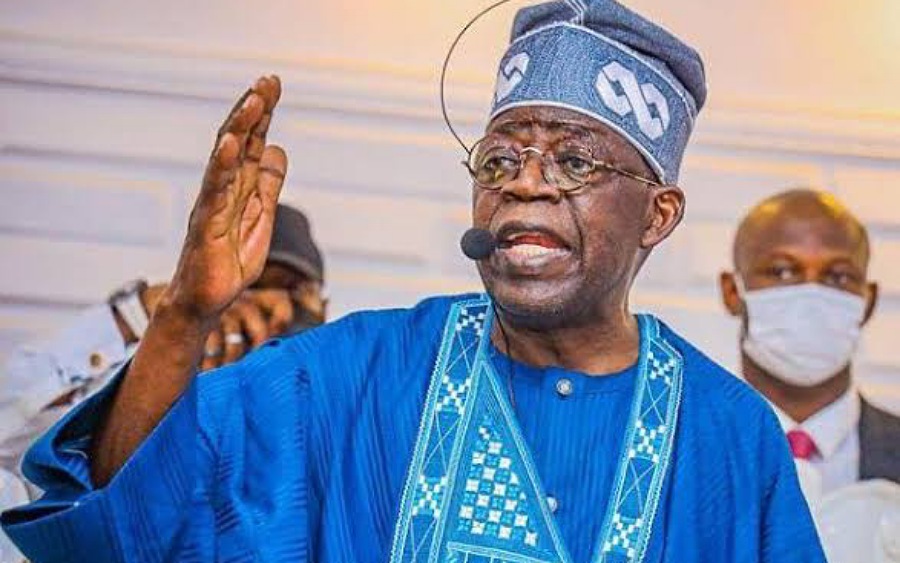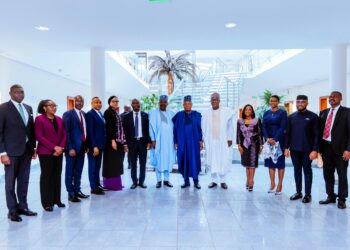The All-Progressive Congress (APC) presidential candidate, Bola Ahmed Tinubu wants to establish a Nigeria-first policy when it comes to power supply in the country if he becomes president.
This is according to his manifesto, cited by Nairametrics. In the manifesto, the APC candidate was clear on some action steps his administration will take if he gets a chance to lead Nigeria.
Nigeria first: According to the manifesto, a Tinubu presidency will ensure that all Nigeria’s natural gas resources are used for power generation in Nigeria before anything else.
- The manifesto stated: “We will introduce a Nigeria First policy by which gas resources shall be directed, as a number one priority to Nigerian power generation. We will, in addition, support power projects that can be delivered quickly to optimize grid reliability, grid interconnectedness and grid wheeling.”
Currently, the country is able to generate over 12,000 MW from existing power plants, however, only 4,500 MW are able to get to homes and businesses due to a lack of adequate and upgraded transmission and distribution infrastructure, which the Siemens power deal under Buhari’s presidential power initiative (PPI) is supposed to address.
Presidential Power Initiative (PPI): Tinubu intends to continue the PPI legacy of the Buhari administration. Under the PPI, Buhari signed the Siemens power deal which is currently ongoing as confirmed by the minister of power, Engr. Abubakar D. Aliyu. Nairametrics had earlier reported that the Siemens power deal, which was signed in 2019, will be executed in three phases: increasing operational grid capacity from 7,000 MW to 11,000 MW and 25,000 MW.
- The manifesto stated: “We shall build on the foundation laid by President Buhari’s Presidential Power Initiative, among other important interventions, to put in place prudent, practical measures that will improve the situation today and make the power sector viable and sustainable for all Nigerians moving forward.”
Abolish estimated billing: A potential Tinubu presidency will eliminate estimated billing, so as to ensure that all Nigerian homes and businesses are running on prepaid meters. It is important to note, however, that the Buhari administration has struggled with putting an end to estimated billing with little success.
- The manifesto stated: By streamlining and accelerating existing schemes such as the National Mass Metering Programme (NMMP) and the Meter Asset Provider Scheme (MAPs), we shall seek to ensure that all electricity connections are properly metered within the shortest possible time frame.”
The manifesto also notes that a Tinubu presidency will reduce import levies on manufacturing inputs and provide other forms of support so that domestic manufacturers are able to compete and meet demand for prepaid meters. The administration will also provide targeted and efficient tax incentives for local meter manufacturing companies.
Electricity tariffs: Tinubu’s campaign promises reasonable electricity tariffs, especially in rural areas of the country. This will be easier to achieve when prepaid meters are installed all over the country, as opposed to estimated billings.
- The manifesto stated: “We will enable distribution companies (DisCos) to charge cost-reflective tariffs for electricity supply. We will streamline and relax regulations to enable private sector, local and state government actors to electrify rural Nigeria in a safe and secure manner with reasonable tariffs. New connections will not be permitted to be energized from the grid unless a meter has been installed. DisCos will be required to ensure that new connections are metered during the construction phase.
Renewable energy: The Tinubu manifesto also notes that it will focus on the continuation of action steps geared towards the use of renewable energy for power, especially in the rural areas. The plan also includes focus on solar energy as well as enabling further research and development of solar technologies.
- The manifesto stated: “We will provide the enabling environment, institutional, legislative and regulatory reforms required to attract foreign and domestic private sector investors, as well as support from donor agencies. We shall focus on grid connectedness while also taking advantage of mini-grid and interconnected mini-grid solutions. We shall encourage greater investment and research into the use of residential solar power solutions. We will encourage universities and polytechnics to become centers of research, devising new and innovative ways to bring more power to rural areas.”
Power sector governance reform: In Tinubu’s manifesto, it is noted that the Electric Power Sector Reform Act of 2005 will be reviewed and reformed to reflect current sector practices. It is important to note that successive governments have made several plans to structure the power sector with little success, and this affects overall performance.
- The manifesto stated: “We shall expand the existing regime for off-grid power generation and explore new ways to exploit clean coal, solar, hydro and other sustainable energy technologies. Adopting a mindset of enthroning international best practices, we will ensure that government processes and procedures improve efficiency and accountability for project management, design, procurement, construction and remittances.”
Bottomline: Stakeholders believe that the continuous adoption of non-cost-reflective tariffs will exacerbate the anemic position of distribution companies (DisCos), prevent the overhaul of poor transmission infrastructure, hinder private sector investments, and constrain the development of the power sector.





















Our major problem right now is insecurity! What about that? Who is going benefit all this when herdsmen are killing us all?
Market reflective tarrif needs a deepening of competition – new discos or retail electricity sellers will need to be licensed…else we will have geographical monopolies that can charge whatever they want without hinder – consumers won’t be able to afford it eventually….competition is needed to keep the price honest / service delivery high…
@Japa Queen, no it doesn’t!
First, electricity is not like mobile phones , and so you cannot have a multiple local “retailers” (which would mean multiple lines, poles and associated infrastructure).
Further, we already know the present tariffs are well below the cost of providing electricity (N20 per kw/h below cost on the average), which is why the sector remains is drowning in red ink and DISCOs are unable to build the sort of balance sheets that would attract equity or debt capital for investment in upgrading and modernizing facilities.